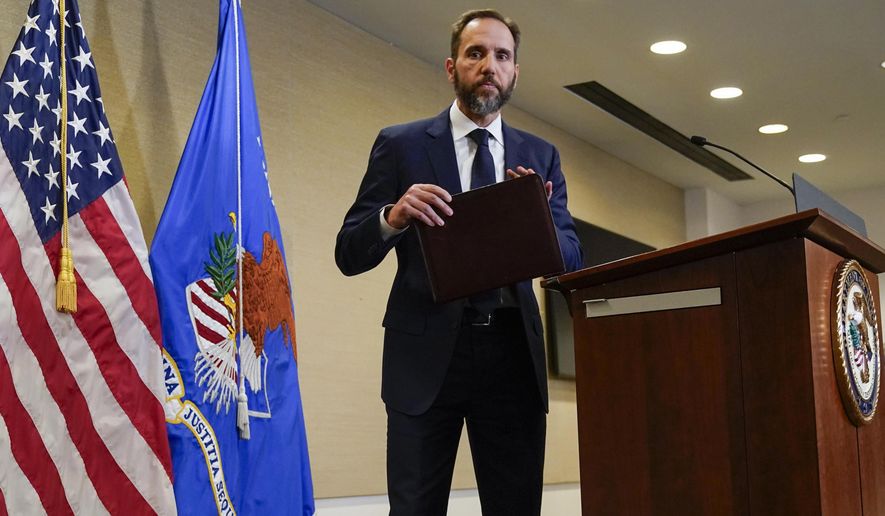Special counsel Jack Smith on Monday moved to dismiss his election subversion case against President-elect Donald Trump, citing the election and precedents that dictate a sitting president cannot be criminally prosecuted.
Mr. Smith said he consulted with the Justice Department’s Office of Legal Counsel and concluded he should drop the case before the inauguration.
He said the prohibition on prosecuting Mr. Trump extends to this situation, in which the president-elect was indicted as a private citizen but chosen for the White House job while the prosecution was underway.
“That prohibition is categorical and does not turn on the gravity of the crimes charged, the strength of the government’s proof, or the merits of the prosecution, which the government stands fully behind,” Mr. Smith wrote in a filing to a federal court in Washington.
The indictment accused Mr. Trump of conspiring against the U.S. and its voters by taking steps to overturn his 2020 election loss to President Biden.
The case was delayed for months by Mr. Trump’s claim he enjoyed immunity for official acts taken during the final months of his presidency.
Mr. Smith pressed forward under a revamped version of the charges but was stymied by Mr. Trump’s win over Vice President Kamala Harris.
The special counsel is unwinding a parallel case that accuses Mr. Trump of unlawfully storing classified documents at his Mar-a-Lago estate in Palm Beach, Florida.
A federal judge dismissed the case but that decision had been under appeal.
Mr. Smith moved Monday to dismiss the appeal against Mr. Trump in Florida but is leaving it intact for two co-defendants, Waltine Nauta and Carlos de Oliveira.
“Unlike defendant Trump, no principle of temporary immunity applies to them,” Assistant Special Counsel James I. Pearce wrote.
The twin actions capped a major turnaround for Mr. Trump, the first former president to face criminal prosecution. Though Mr. Biden formally kept his distance from Mr. Smith’s work, Democrats and their allies hoped the pile of prosecutions would fatally weaken Mr. Trump and his political prospects.
The cases appeared to have the opposite effect. Mr. Trump only strengthened in the eyes of GOP primary voters, and he used courthouse appearances as a high-profile stage to rail against his opponent.
Issues such as immigration and the economy overtook Mr. Trump’s legal woes during the general election contest and he romped to victory over Vice President Kamala Harris on election night.
Mr. Trump still faces multimillion-dollar civil judgments against him, but he’s been winning in court in the criminal cases against him since a Manhattan jury convicted him of business fraud in May.
A Georgia racketeering case against Mr. Trump is in limbo and might not proceed, and a New York judge postponed sentencing Mr. Trump on the felony convictions as he considers motions to dismiss the case.
Mr. Smith’s election case was viewed as the most important of the quartet, given its associations with the transfer of power and the video evidence of pro-Trump supporters storming the Capitol on Jan. 6, 2021, while Mr. Trump contested the certification of Mr. Biden’s win.
The Trump transition team hailed Mr. Smith’s latest move as a huge win.
“Today’s decision by the DOJ ends the unconstitutional federal cases against President Trump, and is a major victory for the rule of law,” said communications director Steven Cheung. “The American people and President Trump want an immediate end to the political weaponization of our justice system and we look forward to uniting our country.”
Sen. Josh Hawley, Missouri Republican, said prosecutors no longer had a motivation to pursue Mr. Trump.
“Confirming what was obvious all along: this ’prosecution’ was nothing more than election interference to keep Trump off the 2024 ballot. The left failed. The people won,” he wrote on X.
Even if Mr. Smith had tried to press forward, Mr. Trump would have stopped him. During the campaign, Mr. Trump vowed to fire Mr. Smith “within two seconds” if he defeated Ms. Harris.
Following the election, Mr. Smith took steps to wind down his cases, leading to the Monday filing.
“The government’s position on the merits of the defendant’s prosecution has not changed,” he wrote. “But the circumstances have: as a result of the election held on November 5, 2024, the defendant will be certified as President-elect on January 6, 2025, and inaugurated on January 20, 2025.”
Mr. Smith pointed to the Office of Legal Counsel’s opinions, in 1973 following the Watergate scandal and 2000 following the impeachment of President Bill Clinton, that said prosecution of a sitting president would be an undue burden on presidential responsibilities.
“OLC concluded that, because a pending criminal prosecution would impair the president’s ability to carry out these responsibilities to the detriment of the nation, the constitutional interest in the president’s unfettered performance of his duties must take precedence over the immediate enforcement of the criminal law against a sitting president,” the filing said.
A footnote in Mr. Smith’s filing says the OLC’s opinions only apply to federal cases, a point that may be of interest to Fulton County District Attorney Fani Willis if she proceeds with her prosecution in Georgia.
The Atlanta-based case was put on hold after defense attorneys said Ms. Willis had a relationship with a lead investigator on the case, posing a financial conflict. The judge allowed Ms. Willis to stay on the case so long as her former boyfriend, Nathan Wade, resigned.
Mr. Wade left the case but defense attorneys appealed the decision. The Georgia Court of Appeals recently canceled a Dec. 5 date for oral arguments, leaving the future of the case uncertain.
• Alex Swoyer contributed to this story.
• Tom Howell Jr. can be reached at thowell@washingtontimes.com.




Please read our comment policy before commenting.